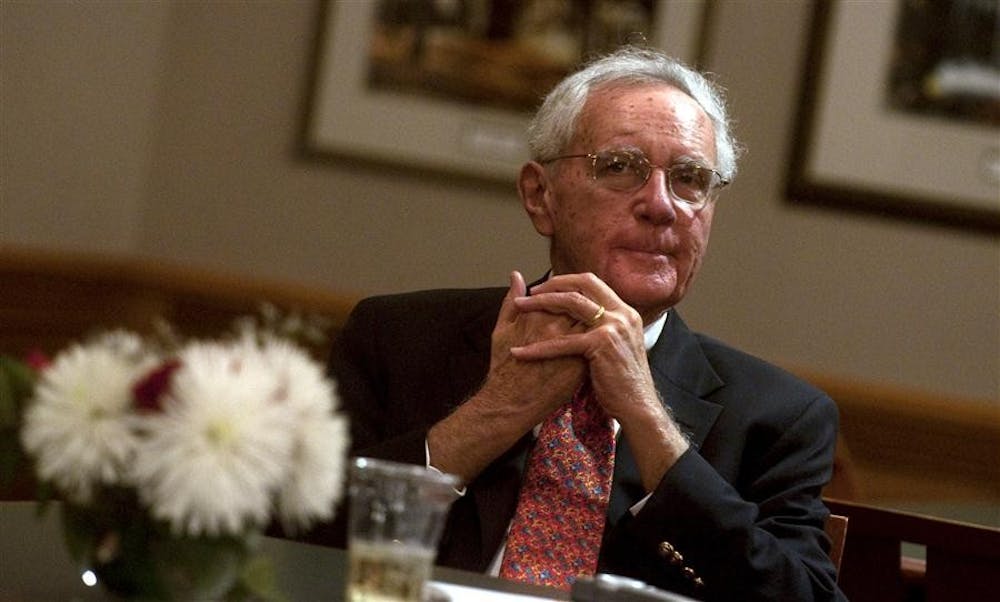Students and faculty are continuing to voice disappointment about the Board of Trustees’ closure of a top administrator’s office, a decision which bypassed several established processes.
Last spring, the trustees closed and removed funding for University Chancellor Ken Gros Louis.
Normally, other top administrators would be consulted before closing an office, and the original letter of appointment from then-President Adam Herbert in 2006 said a review would be conducted after five years.
No review was conducted before the trustees’ decision.
The Bloomington Faculty Council, which had planned to send a letter expressing its concerns and asking for more details about the steps the trustees took, received a memorandum from board chairman Bill Cast detailing the board’s reasoning. The memorandum was also sent to Provost and Executive Vice President Karen Hanson.
In the memo, Cast listed eight reasons for the closure.
However, Gros Louis said several of these points were not relevant to the issue.
The memo cites a five-year contract between the University and Gros Louis. No such contract exists.
Gros Louis was appointed to the position by Herbert and approved by the board at the time. The original agreement was Gros Louis and other administrators, including the president, would be involved in a review of the office’s effectiveness after five years.
“I sometimes wonder if he ever saw Herbert’s letter,” Gros Louis said.
Cast was unavailable for comment.
Cast also said the chancellor’s position was discontinued when the provost’s position was created in 2006.
However, according to IDS reports from January 2006, the role of Bloomington chancellor was discontinued, not that of University chancellor.
In fact, Gros Louis was appointed after the trustee decision to end the Bloomington chancellorship.
The BFC received this memo before it was able to send a letter of its own.
Early drafts of the BFC letter — co-authored by two members of faculty and approved to be forwarded to the trustees by the council — requested information about who was consulted in the decision and expressed concern that the campus would lose valuable leadership and a student resource.
“We would like better to understand why there was no form of formal consultation with the faculty about the termination of this office and the summary dismissal of the University’s most experienced administrator, and why faculty were never notified that this step was contemplated or that it had occurred,” the drafted letter to the trustees read.
BFC President and communication and culture professor Carolyn Calloway-Thomas said the faculty council’s executive committee is continuing to consider the nature of its response.
“Many faculty continue to express some discontent with the process and outcome,” Calloway-Thomas said. “We’re baffled, upset, bewildered.”
In addition to a formal admonition and request for information from the governing faculty body, the IU Student Association Congress plans to respond to the board.
IUSA President Justin Kingsolver said a resolution was supposed to be brought before Congress in its Dec. 6 meeting that would reprimand the board for ending the University chancellorship, a resource many IUSA executives have used for guidance.
Because Congress did not have enough members present to vote, the resolution will be brought before the general assembly at the first meeting of the semester Jan. 17.
Kingsolver said the resolution will censure the trustees, a form of formal disapproval.
“We don’t really have a constitutional procedure for censure,” Kingsolver said. “The Board of Trustees acted inappropriately. They fired him without giving him what they promised to give him.”
The resolution was written because of requests from inside Congress and outside groups, Kingsolver said.
The general outcry from students and faculty alike expresses a desire to be informed and consulted.
“They eliminated a student service without consulting students,” Kingsolver said.
IU reacts to trustee decision
Faculty, student governments express concern to trustees

Get stories like this in your inbox
Subscribe





